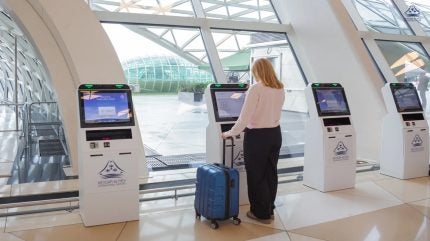
Heydar Aliyev International Airport in Azerbaijan has initiated the first phase of its technological upgrade by installing self-service kiosks in Terminal 1.
The new systems aim to streamline the check-in and baggage drop-off process, reducing wait times and enhancing the overall passenger experience.
These kiosks are part of a strategy to incorporate advanced technologies and improve service standards at Baku Airport, according to the airport.
The self-service kiosks allow passengers to check in for their flights, select seats, and print boarding passes with ease. They also facilitate the baggage drop-off process, enabling passengers to manage their luggage without the need for traditional check-in counters.
However, passengers with baggage exceeding the weight limit are directed to use the traditional check-in desks. The airport plans to further upgrade these kiosks by adding payment functions and expanding their capabilities.
Self-check-in and baggage drop-off services are currently available for passengers of Azerbaijan Airlines.
How well do you really know your competitors?
Access the most comprehensive Company Profiles on the market, powered by GlobalData. Save hours of research. Gain competitive edge.

Thank you!
Your download email will arrive shortly
Not ready to buy yet? Download a free sample
We are confident about the unique quality of our Company Profiles. However, we want you to make the most beneficial decision for your business, so we offer a free sample that you can download by submitting the below form
By GlobalDataAirlines such as Turkish Airlines, Qatar Airways, Uzbekistan Airways, and Kuwait Airways are expected to adopt these services shortly. The kiosks cater specifically to passengers departing directly from Baku.
For transit passengers, the registration process will continue as per the traditional method.
Recently, Heydar Aliyev International Airport commissioned the renovated runway 17/35. The renovation included the replacement of the artificial asphalt concrete pavement and the upgrade of the instrument landing system (ILS).
The project also included enhancements to the drainage systems and existing taxiways in addition to the construction of three new taxiways.
In 2019, the airport claimed to become the world’s first to fully transition to cloud technologies, partnering with IT provider Amadeus to manage its passenger and operational systems.



